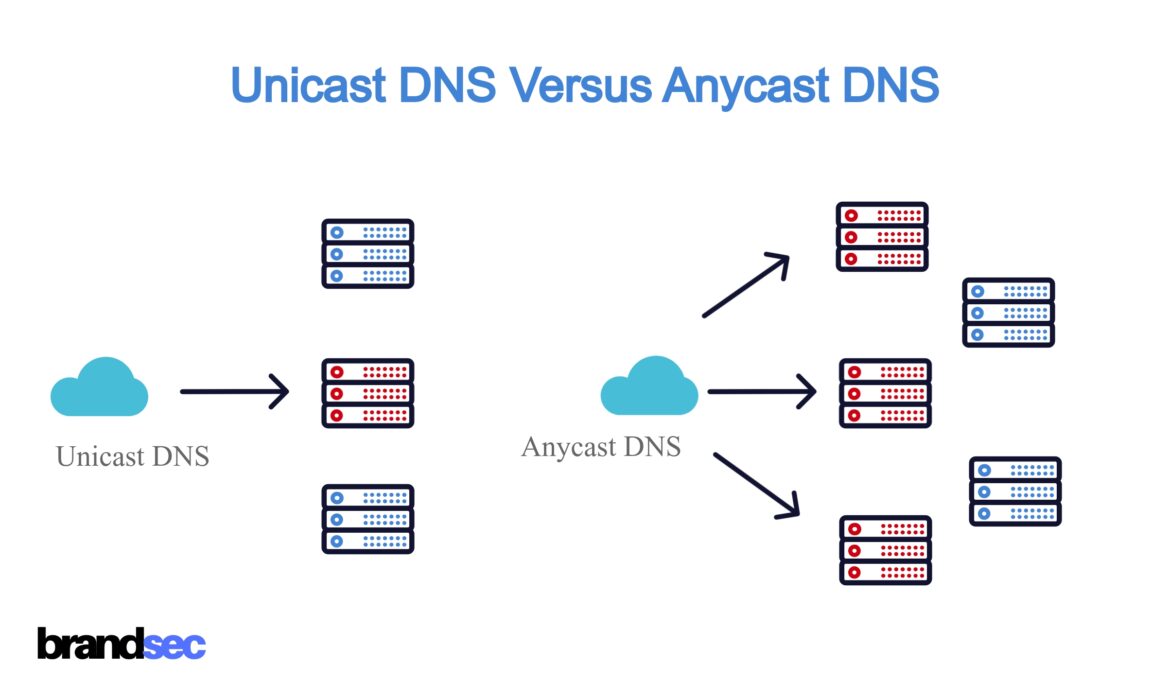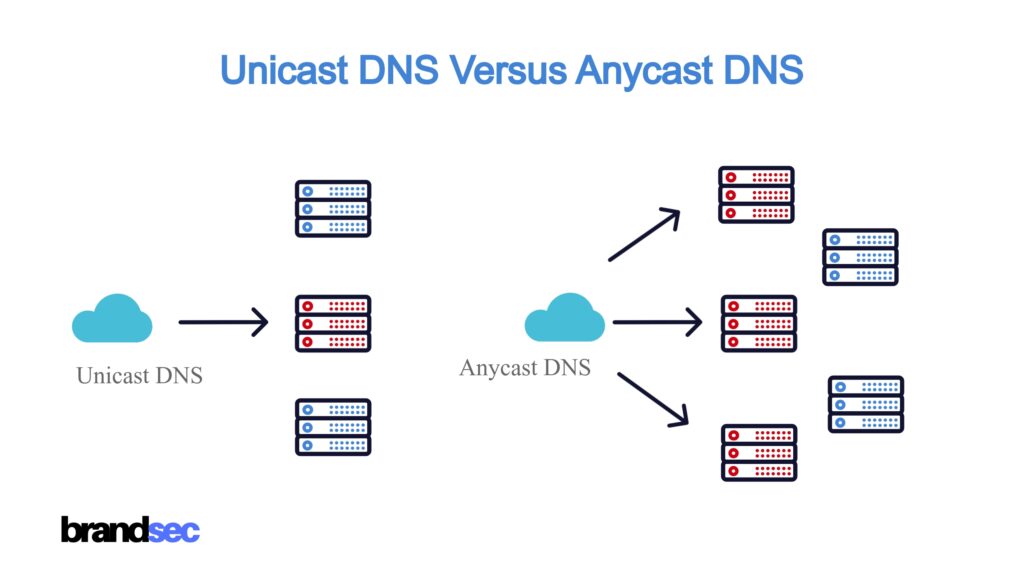
15 December 2022
Anycast and Unicast are two different methods for routing network traffic in a network. Both methods are commonly used in the Domain Name System (DNS), which is the system that translates human-readable domain names (like google.com) into the numerical IP addresses that computers use to communicate with each other on the internet.
Unicast DNS is the traditional method for routing DNS traffic. In a Unicast DNS system, each DNS server is assigned a unique IP address, and client devices send DNS queries to a specific DNS server using that IP address. This method is simple and effective, but it has some limitations. For example, if the DNS server that a client device is trying to reach becomes unavailable, the client will not be able to resolve DNS queries until the server is back online.
Anycast Enterprise DNS is a more advanced method for routing DNS traffic. In an Anycast DNS system, multiple DNS servers are configured with the same IP address, and client devices send DNS queries to that IP address. The network routing infrastructure then automatically directs the query to the nearest available DNS server, based on the location of the client and the availability of the servers. This allows for faster and more reliable DNS resolution because client devices can reach a DNS server even if the server they were originally trying to reach is unavailable.

Anycast offers routing capability across its network whereas unicast DNS is uni-directional which creates a single point of failure
Anycast Enterprise DNS offers improved performance
Anycast Enterprise DNS is considered to be a more efficient and resilient way of routing DNS traffic compared to Unicast DNS. It allows for faster DNS resolution and better availability, which can improve the performance and reliability of internet services. It also provides greater resilience against DNS-specific DDoS attacks due to its method of distributing traffic across its network.
Anycast routing distributes traffic across multiple DNS servers that are located in different regions. This allows the service to route traffic to the nearest available server, which helps to improve the performance of DNS resolution by reducing the latency and increasing the speed of response.
A good Anycast Enterprise DNS network incorporates a load-balancing feature that automatically distributes traffic across multiple DNS servers, based on the availability and capacity of the servers. This help improves the performance of DNS services by ensuring that they are not overwhelmed by high volumes of traffic. Unicast can be overwhelmed by high volumes of traffic as it does not have the same routing capability of Anycast DNS.
Anycast Enterprise DNS Security Features
Major Anycast DNS networks such as UltraDNS offer a range of security features designed to protect against various types of cyber attacks, including DDoS attacks. such as:
- Anycast routing: UltraDNS uses Anycast routing to distribute traffic across multiple DNS servers that are located in different regions. This allows the service to route traffic to the nearest available server, which can help to improve performance and reliability, and also provides a level of protection against DDoS attacks by distributing the attack traffic across multiple servers.
- DDoS protection: UltraDNS includes built-in DDoS protection that is designed to automatically detect and mitigate DDoS attacks. This protection uses advanced algorithms and machine learning to identify and block traffic that is indicative of a DDoS attack while allowing legitimate traffic to pass through to the target website or service.
- GeoIP filtering: UltraDNS includes a GeoIP filtering feature that allows administrators to block traffic from specific countries or regions. This can be useful for protecting against DDoS attacks that originate from a specific location.
- Encryption: UltraDNS offers encryption for DNS traffic using the DNS over HTTPS (DoH) and DNS over TLS (DoT) protocols. This helps to protect against DNS spoofing and other types of DNS-related attacks by ensuring that the traffic is secure and cannot be intercepted or tampered with.
Why Choose Anycast Enterprise DNS over a Domain Registrar’s free DNS service?
Anycast Enterprise DNS services such as UltraDNS are designed to provide a high-performance, scalable, and secure DNS hosting and management service. It offers a range of features, such as Anycast routing, caching, load balancing, and encryption, that are designed to improve the performance, reliability, and security of DNS services. These features are particularly useful for websites and online services for critical digital assets that receive a large amount of traffic, or that have specific security or performance requirements.
By contrast, domain registrar DNS services are typically included for free as part of a domain registration package, and they are intended to provide a basic DNS hosting and management service for domain names that are registered with the registrar. These services are often on an open bind / unicast DNS network and are vulnerable to attacks and volume issues.
Overall, UltraDNS is generally considered to be a more comprehensive and advanced DNS hosting and management service compared to domain registrar DNS. It offers a wider range of features and capabilities, and it is designed to provide a higher level of performance, reliability, and security for websites and online services.
About brandsec
Brandsec is a corporate domain name management and brand protection company that look after many of Australia, New Zealand and Asia’s top publicly listed brands. We provide monitoring and enforcement services, DNS, SSL Management, domain name brokerage and dispute management and brand security consultation services.

